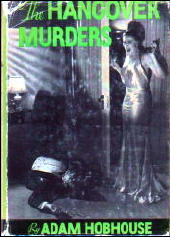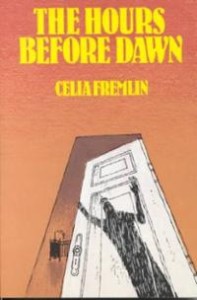 I finished two crime novels around the same time. I historically never read more than one title at at time. I thought I needed complete concentration on one–or I thought I’d be cheating on the book if I read a another as well. With age, and less time, I find myself reading at least 2 and most likely 4 or 5 at a time. Naturally, some never are finished. They bored me, or I forgot where I laid them or they were fine but I never bothered picking them up again. I thought the former was going to happen to The Hangover Murders, because honestly, I was getting mighty sick of the characters constantly being drunk, or if not drunk, drinking to get drunk.Yes, I’m aware of the title–but I did think that the hangover part would prevail. Not so. The book begins with a well to do married couple awaking to horrific hangovers, both of them had been sauced to the point of blackouts. Neither can remember most of the night before. Each woke up after a particularly distasteful nightmare, of which neither could remember the details. They are guests of another well healed fellow and his wife, and after they drink to cure their hangover, they crawl over to their host’s room to inquire as to what they did last night and how they ended up back where they started from. Unfortunately, Jack not only is hung over, he’s dead. Jack’s wife is no where around. The narrator is the hungover husband, so he’s immediately excluded as the murderer–or is he? Since he has no memory, he can narrate till the cows come home and still have been the killer. It’s not until the doctor takes Jack’s body away that murder is declared. Up until then, the couple figured Jack had died of alcohol poisoning. Sad when the first thought as to why a 20 some year old would croak is being too drunk. OK so the beginning of the story was intriguing, especially when the wife shows up with another man and has all varieties of motives and suspects including chauffeurs. After the second murder occurs, things went downhill for me as the reader. First off, the second victim has just finished hypnotizing all the suspects within one room–and a shot that killed him came from outside. Now the pool of suspects is no longer within those with hangovers, and the interest for me plummets. However, I stay the course, read the entire thing, and the only lesson I learned, is that rich people can drink, drive drunk, party till the end of time, in 1930, and there are little consequences. Still, the basic theme was interesting, I had hoped for more than what I got.
I finished two crime novels around the same time. I historically never read more than one title at at time. I thought I needed complete concentration on one–or I thought I’d be cheating on the book if I read a another as well. With age, and less time, I find myself reading at least 2 and most likely 4 or 5 at a time. Naturally, some never are finished. They bored me, or I forgot where I laid them or they were fine but I never bothered picking them up again. I thought the former was going to happen to The Hangover Murders, because honestly, I was getting mighty sick of the characters constantly being drunk, or if not drunk, drinking to get drunk.Yes, I’m aware of the title–but I did think that the hangover part would prevail. Not so. The book begins with a well to do married couple awaking to horrific hangovers, both of them had been sauced to the point of blackouts. Neither can remember most of the night before. Each woke up after a particularly distasteful nightmare, of which neither could remember the details. They are guests of another well healed fellow and his wife, and after they drink to cure their hangover, they crawl over to their host’s room to inquire as to what they did last night and how they ended up back where they started from. Unfortunately, Jack not only is hung over, he’s dead. Jack’s wife is no where around. The narrator is the hungover husband, so he’s immediately excluded as the murderer–or is he? Since he has no memory, he can narrate till the cows come home and still have been the killer. It’s not until the doctor takes Jack’s body away that murder is declared. Up until then, the couple figured Jack had died of alcohol poisoning. Sad when the first thought as to why a 20 some year old would croak is being too drunk. OK so the beginning of the story was intriguing, especially when the wife shows up with another man and has all varieties of motives and suspects including chauffeurs. After the second murder occurs, things went downhill for me as the reader. First off, the second victim has just finished hypnotizing all the suspects within one room–and a shot that killed him came from outside. Now the pool of suspects is no longer within those with hangovers, and the interest for me plummets. However, I stay the course, read the entire thing, and the only lesson I learned, is that rich people can drink, drive drunk, party till the end of time, in 1930, and there are little consequences. Still, the basic theme was interesting, I had hoped for more than what I got.
The other unusual subject is sleep deprivation via baby. In The Hours Before Dawn, another recent read of Celia Fremlin, the entire book is through the eyes of the sleepless mother of two young daughters and a 6 month old night screaming child. It isn’t first person, yet the reader feels as though they too are desperately trying to snatch a few winks, are falling asleep at the washing up of dishes, defensive to neighbors, mother-in-law, and husband. I found no one likable in this book. I wanted to shake the mother until some sense infiltrated her oxygen deprived brain. I wanted the husband to be forced to change dirty diapers for eternity. I wanted the baby to be sedated, the thoughtless girls banished to boarding school, the so called friends to be imprisoned, and the villainess of the piece, if that was what she was, sent to a mental institution. Ms Fremlin wrote the intro to my version explaining that she hadn’t meant for the husband to be considered a monster, that no one in the book is a monster, just human. However, what she fails to  realize that the very fact of the husband’s ignoring his wife’s situation and expecting her to be all things to all people made him tremendously unlikable. Yes, it was written at a time when women were expected to do everything within the home without the husband lifting a finger. And the mother certainly does that. But it’s more–it’s the obviousness of her being overwhelmed and no one bothering to help, especially him, that makes him so detestable. He whines about his dinner, his lunch–which he comes home for, of all things, while she’s trying to iron or wash, or scrub floors or just keep the baby asleep. If that weren’t enough, a selfish friend keeps unloading her two children on the mother to watch for her, while she does something else, like pottery class. There is a great deal of sly satire on the ‘correct’ way to raise children. Every mother in the book has a theory and a different absolutely solid idea of what to do, while their own kids are wreaking havoc. The mother is criticized by other mothers, her child detesting mother-in-law, her husband, the local place for mother assistance, neighbors, but not the new silent roomer who has recently moved in. This sinister–only to the mother–female appears to be watching, waiting, for what, the mother and reader do not find out until the very end. In the meantime, the sleep walking mother takes the baby out in the middle of the night in the stroller so as to not wake the household or neighbors, and falls asleep on a park bench to wake and find her baby gone. She frantically finds a police officer who calls her husband, and reports her baby is snug and asleep in his bed at home. She doesn’t know what’s real and what isn’t. Her suspicions of the roomer increase, and she starts investigating even within her exhausted state. Another occurrence of the baby vanishing seals the mother’s conviction that the roomer has her hand in the baby’s disappearances and reaapearances and intends to prove it.
realize that the very fact of the husband’s ignoring his wife’s situation and expecting her to be all things to all people made him tremendously unlikable. Yes, it was written at a time when women were expected to do everything within the home without the husband lifting a finger. And the mother certainly does that. But it’s more–it’s the obviousness of her being overwhelmed and no one bothering to help, especially him, that makes him so detestable. He whines about his dinner, his lunch–which he comes home for, of all things, while she’s trying to iron or wash, or scrub floors or just keep the baby asleep. If that weren’t enough, a selfish friend keeps unloading her two children on the mother to watch for her, while she does something else, like pottery class. There is a great deal of sly satire on the ‘correct’ way to raise children. Every mother in the book has a theory and a different absolutely solid idea of what to do, while their own kids are wreaking havoc. The mother is criticized by other mothers, her child detesting mother-in-law, her husband, the local place for mother assistance, neighbors, but not the new silent roomer who has recently moved in. This sinister–only to the mother–female appears to be watching, waiting, for what, the mother and reader do not find out until the very end. In the meantime, the sleep walking mother takes the baby out in the middle of the night in the stroller so as to not wake the household or neighbors, and falls asleep on a park bench to wake and find her baby gone. She frantically finds a police officer who calls her husband, and reports her baby is snug and asleep in his bed at home. She doesn’t know what’s real and what isn’t. Her suspicions of the roomer increase, and she starts investigating even within her exhausted state. Another occurrence of the baby vanishing seals the mother’s conviction that the roomer has her hand in the baby’s disappearances and reaapearances and intends to prove it.
Although an Edgar Poe Award winner for first mystery, I enjoyed another of her titles much more. Maybe had I been through the terrible experience many parents suffer of a child waking them nightly, I’d have had more sympathy, but the mother set my teeth on edge with her passive existence. Nonetheless, as usual, Ms. Fremlin writes a compelling riveting story that I didn’t want to leave.
Two offbeat subjects, one not so interesting, the other interesting, but annoying.
